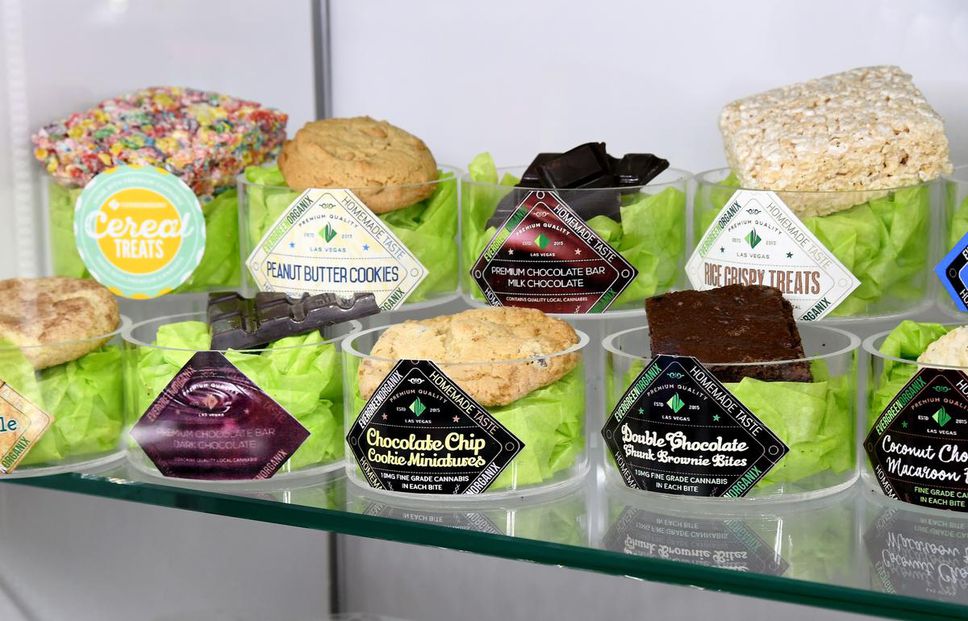You are here
Home 🌿 Recreational Marijuana News 🌿 Why it will be another year before cannabis edibles come on the market 🌿Why it will be another year before cannabis edibles come on the market

When the recreational cannabis market opens across Canada on Oct. 17 there will be a huge chunk of it missing.
Edible products — which are expected to represent more than 50 per cent of dollar value sales in pot purchases when they are legalized — will not be available for at least a year after smokable buds and oils hit the shelves.
But there will be no law stopping buyers from using combustible buds and oils to cook up their own eats.
“People will be free to smoke or bake with their purchases,” says Jo Vos, managing director of Leafly Canada, a cannabis information company that is tracking the legal changes closely.
Pot-and-hash-laced cookies, brownies and other homemade confections will be perfectly legal despite their absence from regulated online and street-front stores, Vos says.
While they are eager to welcome the massive edibles market, however, even cannabis advocates say the federal delay in their introduction is justified by the additional complexity that formulating food regulations requires.
“When you get into the realm of food you’re bringing all sorts of new regulations and requirements around safe production and health concerns,” says Matei Olaru, CEO of the Toronto-based Lift & Co.
“You’re getting to the food space and that itself is a whole new world,” says Olaru, whose company will offer a “trip adviser” web function to help consumers navigate a complex cannabis world once legalization of the inhalable products commences Oct. 17.
Vos, says the federal government will begin consultations on edible products with producers, food makers and other interest groups this winter with an eye on legalization in October of 2019.
“Clearly they’re being prudent in their approach given the complexity of cannabis and the nature of edibles,” says Vos, who heads the new Canadian arm of the Seattle-based company.
“They have to keep public health in mind and it’s clearly of paramount importance that the regulations be established (beforehand),” says Vos, whose site already has a segment dedicated to edible usage that includes dosing and selection tips.
The strict labelling and content rules the regulations will spawn will also help stave off the “freak out” level highs that many neophyte users experience with illicit edible products, says Will Hyde, a marijuana sommelier and a senior subject matter expert with Leafly.
“A lot of the concern over edibles all comes down to proper dosing and understanding how cannabis is metabolized in your system when you eat it versus when you inhale it,” Hyde says.
“So, yes, having a regulated dose goes a long way and also there’s more consistency from product to product so as people try a new edible product the dose will likely be the same or at least similar.”
A key contributor to cannabis overdoses among edible users is the lengthy lag that exists between ingestion and the onset of a high — a lull that’s much longer than the one that accompanies inhaled products.

Will Hyde, a marijuana sommelier and a senior subject matter expert with Leafly Canada, says self control will be key for consumers of edibles.
That delayed onset — due to the need to digest the active compounds before they can enter the blood stream — has caused many new users to eat more in an attempt to boost a rush that, upon its eventual arrival, will be too much to handle.
This practice has landed some people in hospital. But doctors surveyed at Toronto’s St. Michael’s Hospital emergency room — one of the country’s busiest — said they had seen too few cases to form an expert opinion on the scope or severity of this overdose problem, a hospital spokesperson says.
Even so, Vos says cannabis legalization will help people suffering from frightening episodes by making them more open to going to an ER.
“Cannabis legalization empowers people to report emergencies. If you are having a situation at home you can feel safe knowing that you can (go to) a hospital ... in a safe and legal way.”
Avoiding such edible overdoses is mostly a matter of education, Vos says.
“We generally say go low, go slow,” she says. “That’s a rule of thumb to certainly follow.”
Self control will be key as well, Hyde says.
“A lot of times the treats that you’re eating or the infused food that you’re eating is really delicious,” he says.
420 Intel is Your Source for Marijuana News
420 Intel Canada is your leading news source for the Canadian cannabis industry. Get the latest updates on Canadian cannabis stocks and developments on how Canada continues to be a major player in the worldwide recreational and medical cannabis industry.
420 Intel Canada is the Canadian Industry news outlet that will keep you updated on how these Canadian developments in recreational and medical marijuana will impact the country and the world. Our commitment is to bring you the most important cannabis news stories from across Canada every day of the week.
Marijuana industry news is a constant endeavor with new developments each day. For marijuana news across the True North, 420 Intel Canada promises to bring you quality, Canadian, cannabis industry news.
You can get 420 Intel news delivered directly to your inbox by signing up for our daily marijuana news, ensuring you’re always kept up to date on the ever-changing cannabis industry. To stay even better informed about marijuana legalization news follow us on Twitter, Facebook and LinkedIn.




